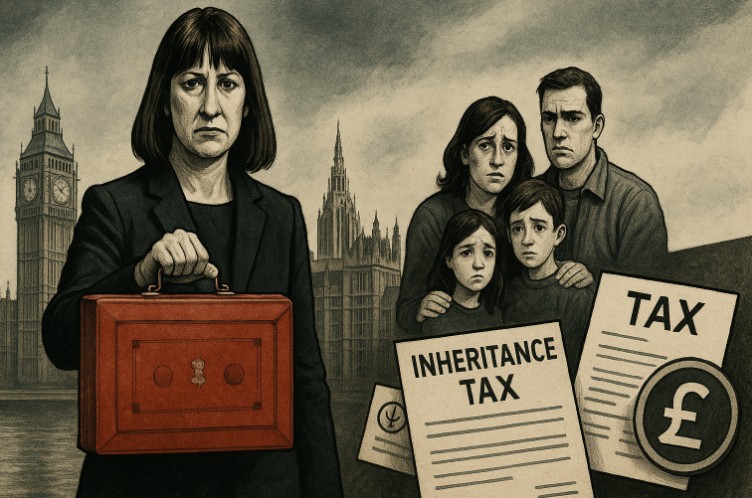In the wake of ongoing economic instability and fiscal pressure, Labour’s proposed inheritance tax changes have ignited fierce political and public debate.
Chancellor Rachel Reeves is under scrutiny after reports suggested significant reforms could be on the horizon including scrapping the long-standing seven-year gifting rule.
Critics argue these changes could punish ordinary families, while supporters say they are a necessary response to long-term economic imbalances.
As Labour eyes reforms to address a £50bn fiscal black hole, questions are rising around the balance between tax fairness, fiscal responsibility, and protecting family wealth. Here’s everything you need to know.
What Are Labour’s Proposed Inheritance Tax Changes?

Labour’s proposed inheritance tax changes have stirred significant attention across political, economic, and financial circles.
While no finalised policies have been published, multiple credible sources, including The Independent and The Guardian, suggest that HM Treasury under Chancellor Rachel Reeves is actively reviewing the UK’s existing inheritance tax structure with the aim of increasing revenue and closing perceived loopholes.
Abolition of the Seven-Year Rule
One of the most consequential reforms under consideration is the removal of the “seven-year rule”, a longstanding principle in UK inheritance tax legislation.
Currently, individuals can give away assets such as cash, property, or shares and, provided they live for seven years after the gift, it is exempt from inheritance tax.
This rule has traditionally enabled families to pass on wealth tax-efficiently across generations.
Labour is reportedly exploring the abolition of this rule, meaning gifts would remain liable to inheritance tax regardless of when they were given, even decades before death.
This move is intended to prevent wealthy individuals from using early gifting as a tool for tax avoidance.
However, critics argue that scrapping the rule would also capture a vast number of modest estates, disproportionately affecting middle-income families who engage in long-term financial planning.
Revision or Elimination of Taper Relief
Closely related to the seven-year rule is taper relief, which gradually reduces the rate of inheritance tax applied to gifts made between three and seven years before death.
Under current legislation, the rate drops from 40% to as low as 8% depending on the time elapsed.
Here is how taper relief currently works:
| Years Between Gift and Death | Tax Rate Applied |
| Less than 3 years | 40% |
| 3 to 4 years | 32% |
| 4 to 5 years | 24% |
| 5 to 6 years | 16% |
| 6 to 7 years | 8% |
| 7+ years | 0% |
Labour is reportedly reviewing this taper system and may consider removing or flattening it, potentially applying a single standard inheritance tax rate on all gifts made within a fixed period before death.
Critics argue that this would punish long-term estate planning and reduce flexibility for older adults hoping to support their children or grandchildren.
Introduction of a Lifetime Cap on Gifts
Currently, UK residents can give away up to £3,000 annually in tax-free gifts, alongside other allowances such as wedding gifts and small gifts under £250. Beyond these, gifts can still be exempt if the giver survives seven years, as outlined above.
Labour’s proposal may involve a fixed lifetime cap on the total value of gifts that can be given tax-free a radical departure from the current system.
This would mean that even gifts made many years before death could become taxable once an individual’s lifetime cap is exceeded.
For example, if a lifetime tax-free gift cap were set at £250,000, any gifts beyond this threshold, regardless of when given, could be subject to inheritance tax, even decades before death.
This would not only transform the timing and strategy of wealth transfer but could also increase the administrative burden on families and tax authorities.
Impact on Estate Planning and Trusts
Although not explicitly confirmed, policy experts believe Labour’s changes may extend to the use of trusts, which are often used by high-net-worth individuals to minimise tax exposure. Trusts can shield assets from immediate tax liability and help maintain control over how wealth is distributed.
Proposed reforms may include:
- Tighter regulations on the use of discretionary trusts
- Mandatory reporting of large lifetime gifts
- Increased scrutiny of offshore holdings
These steps would likely form part of a wider effort to close loopholes and ensure more uniform enforcement of tax rules across all income levels.
Framing It As a Wealth Tax in All But Name
Though Labour has not officially endorsed a wealth tax, these inheritance tax changes effectively act as a form of indirect wealth taxation.
By targeting unearned wealth passed through generations particularly through property, pensions, and investments the party aims to make the tax system more progressive without imposing direct levies on income.
Supporters argue this reflects modern realities, where wealth accumulation through property and inheritance has created growing inequalities.
Critics, however, warn that such policies could deter savings, reduce capital investment, and even lead to the relocation of wealth and talent overseas.
Why Is Labour Considering These Reforms Now?

The push for inheritance tax reform comes amid growing pressure on public finances. Labour faces a daunting £50bn budget shortfall, driven by:
- U-turns on planned tax increases
- Higher-than-expected borrowing costs
- Stagnating economic growth
A recent analysis by the National Institute of Economic and Social Research (NIESR) urged the chancellor to deliver bold fiscal measures in the upcoming autumn statement.
The institute’s recommendations have added to the urgency within Labour to find sustainable revenue sources.
Taxing wealth transfers is seen as a politically delicate but potentially effective tool, especially in an era where wealth inequality is a growing concern.
However, critics argue that such reforms would shift the burden onto families who have saved responsibly.
How Could These Changes Impact UK Families?

If Labour implements the proposed reforms, the impact on family estates particularly in the middle and upper-middle class — could be profound.
Example Scenarios:
- Pension taxation: From April 2027, pensions passed on after age 75 may face 40% inheritance tax. According to Scott Gallacher of Rowley Turton, families with multiple children and estates over £1 million may end up leaving more to the Treasury than to their own heirs.
- Estate planning challenges: Scrapping the seven-year rule and introducing lifetime gift caps would limit families’ ability to distribute wealth tax-efficiently.
Expert Commentary:
Rob Mansfield, an independent financial advisor at Rootes Wealth Management, warns:
“It’s a double whammy if you’re over 75. Inheritance tax on pensions and additional income tax on withdrawals will penalise responsible savers.”
These policy shifts could therefore discourage long-term saving, complicate estate planning, and erode wealth built over generations.
Who Supports Inheritance Tax Reform – And Why?
Despite the controversy, some economists and policymakers argue that reform is overdue.
Jonathan Portes, a former Treasury adviser and professor of economics at King’s College London, stated:
“Inheritance tax certainly needs reform – it is too easy for very rich people with good tax advice to avoid.”
Supporters of reform cite:
- Fairness: Wealthier individuals often use complex structures to avoid tax, leaving middle-income families to shoulder the burden.
- Revenue generation: Even modest reforms could yield billions in tax revenue.
- Wealth redistribution: Taxing inherited wealth is seen as a way to reduce inequality and promote social mobility.
While Portes concedes the changes “won’t raise tens of billions,” he believes reform is a necessary step toward a fairer and more efficient tax system.
What Are the Main Criticisms of Labour’s Inheritance Tax Strategy?
Labour’s inheritance tax plans have not gone unchallenged.
Key Critics:
- Sir Mel Stride, Conservative shadow chancellor:
“Labour is coming for your family’s future to fund their failure.”
- Nadhim Zahawi, former chancellor:
“If the chancellor wants a sure-fire way to endanger Britain’s finances further, raising inheritance tax would be top of the list.”
Common Concerns:
- Punishment of savers: Critics say the changes unfairly penalise those who have worked hard and planned responsibly.
- Deterrence to investment: Business leaders argue the reforms could encourage high-net-worth individuals to leave the UK.
- Revenue uncertainty: Some experts question whether the proposed reforms will generate meaningful revenue without negative side effects.
These voices argue instead for reducing government spending rather than increasing tax burdens.
Could These Tax Reforms Hurt Economic Growth?
A major concern surrounding the proposed inheritance tax changes is their potential impact on economic growth.
Sarah Coles, head of personal finance at Hargreaves Lansdown, warned:
“At the moment, these gifts allow for money to pass through the generations, feeding the economy through stamp duty and VAT.”
Key Points:
- Reduced spending: Heirs may delay or reduce spending due to larger tax liabilities.
- Impact on the property market: Families may avoid transferring homes, reducing transactions and stamp duty revenue.
- Lower pension savings: If pensions are taxed more heavily, people may save less for retirement.
If not carefully implemented, these reforms could therefore dampen consumer activity and investment — two critical drivers of economic growth.
Are These Changes Finalised or Still Under Consideration?
As of now, no official policy has been announced by the Treasury or Labour leadership. However, sources from The Guardian and The Independent indicate that serious discussions are ongoing behind closed doors.
An HM Treasury spokesperson commented:
“Changes to tax and spend policy are not the only way to strengthen public finances. Our focus is growing the economy, as seen with our planning reforms projected to generate £6.8bn.”
This statement suggests that while tax changes are being reviewed, they are only part of a broader economic strategy.
The autumn Budget, expected later this year, will provide clarity. Until then, speculation and debate are likely to continue.
What Does This Mean for Your Family’s Financial Planning?

For families concerned about potential changes to inheritance tax, the best course of action is to:
- Review your estate: Understand how much of your wealth might be subject to inheritance tax.
- Consult a tax advisor: Professional guidance is crucial, especially if changes affect gifting or pensions.
- Consider diversification: Explore other tax-efficient vehicles, such as ISAs or trusts.
Practical Tips:
- Utilise the current £3,000 annual gift allowance
- Make use of spousal exemptions and charitable gifts
- Stay informed on upcoming Budget announcements
Estate planning will only become more important if Labour proceeds with its proposed reforms.
Conclusion
Labour’s potential inheritance tax reforms mark a critical moment in UK tax policy. While aimed at closing a budget gap and promoting fairness, these changes could have significant consequences for family wealth, pension planning, and economic growth.
Whether seen as overdue reform or a punitive measure, one thing is clear UK families must stay informed and be proactive in adjusting their financial strategies.
With the autumn Budget approaching, the government’s final decisions will set the tone for the coming years. Until then, this debate over inheritance tax will remain a central issue in British political and economic discourse.
Frequently Asked Questions
What is the seven-year rule in UK inheritance tax?
It’s a rule that exempts gifts from inheritance tax if the giver survives for seven years after giving. Labour is reportedly considering scrapping this rule.
Who pays inheritance tax under current UK law?
Inheritance tax is typically paid by the estate if it’s worth more than £325,000, with rates starting at 40%.
How might Labour’s proposed changes affect pensions?
From April 2027, pensions inherited from someone over 75 may be taxed at 40%, affecting beneficiaries and retirement planning.
Will removing taper relief make inheritance tax more expensive?
Yes. Without taper relief, all gifts within seven years of death could be taxed at the full 40% rate.
Are inheritance tax changes likely to become law soon?
Not immediately. Reforms are under discussion and may be revealed in the autumn Budget.
How can families prepare for potential inheritance tax changes?
Seek advice from financial planners, review estate plans, and use existing exemptions while they’re still available.
Why is inheritance tax considered controversial in the UK?
Many see it as a double tax on money already earned, while others view it as a tool to reduce wealth inequality.








